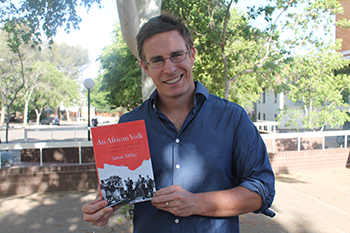Latest News Archive
Please select Category, Year, and then Month to display items
13 November 2018
Photo Moeketsi Mogotsi
 Kovsies took an active stance against sexual and gender-based violence through various campaigns in October.
Kovsies took an active stance against sexual and gender-based violence through various campaigns in October.
President Cyril Ramaphosa recently announced that South Africa will launch a national strategic plan to tackle gender-based violence (GBV) after years of lobbying by activists. Speaking at the Presidential GBV Summit, the head of state commended activists who called for a nationwide shut down in August in response to high levels of GBV and femicide in the country. He says the government is now reviewing national GBV plans and will develop a national action plan.
Activism at the UFS
One of the efforts launched by the University of the Free State’s (UFS) Gender and Sexual Equity (GSE) Office in the fight against this plague is the # RESPECTME campaign. From 11 to 26 October 2018, the university held its own 16 Days of Activism.
Geraldine Lengau of the GSE Office believes that minority groups deserve the same amount of respect as all other citizens of this country, which is the core concept of the campaign. “The Campaign is a loudhailer to say, ‘just because I am different from you’, be it gender or sexuality, it doesn’t mean that I deserve any less respect,” she highlighted.
Lengau added: “Activism will forever remain important on our campuses as it creates an environment where the community is made aware of matters that would otherwise not have mattered had they not been publicised. Also activism becomes all the more important in advancing the university’s strategic plan.”
Policies advocating against GBV
As stipulated in the UFS Sexual Harassment, Misconduct and Sexual Violence Policy the university strongly believes in the principle of human dignity that is entrenched in the Constitution of South Africa (1996) which resolves to ensure a safe working and study environment for students.
Student Affairs also led a campaign which aimed to highlight the ongoing scourge of sexual and gender-based violence, in line with the policy. “The university is working relentlessly at endorsing the aspects and characteristic traits of respect amongst all of its stakeholders in an effort to reduce the notion of gender-based violence,” said the Dean of Student Affairs, Pura Mgolombane.
US author launches book at UFS on African volk
2016-10-17

Dr Jamie Miller, Postdoctoral Fellow at the
University of Pittsburgh and author of
An African Volk: The Apartheid Regime
and Its Search for Survival.
Photo: Rulanzen Martin
“I realised the importance of not just accessing the policies and political approaches of the leaders of the apartheid regime, but understanding the ideas and world views that informed them. Part of the solution to this was to learn Afrikaans.”
This is according to Dr Jamie Miller, a Postdoctoral Fellow at the University of Pittsburgh, on how he went about getting inside the mind of South Africa’s apartheid regime in order to complete his book, An African Volk: The Apartheid Regime and Its Search for Survival.
The book was launched on 11 October 2016 by the Archive for Contemporary Affairs at the University of the Free State on the Bloemfontein Campus.
Volk refers to the Afrikaner nationalist movement
The book is an ambitious new international history of 1970s apartheid South Africa. It is based on newly declassified documents and oral histories, the majority in Afrikaans, which focus on the regime’s attempts to turn the new political climate to its advantage.
The term volk refers to the Afrikaner nationalist movement, also known as Afrikanerdom. The story of Afrikaner nationalism was the medium through which the regime gained power.
Four main messages from the book
Dr Miller says there are four main messages for his readers. Firstly, the apartheid regime looked to contest and hijack new ideas and norms that formed the postcolonial world, and secondly, that we need to start thinking more seriously about the Cold War in terms of domestic politics, not just geopolitics.
Thirdly, South Africa should be integrated into histories of the global South, and lastly, we should conceptualise the apartheid regime by looking at it not just as an imperial holdover, but also by looking at what was happening in the world in the time period in question.